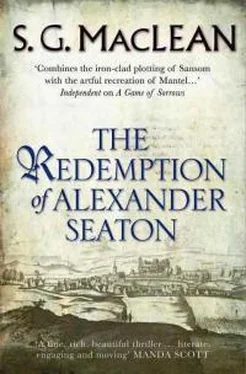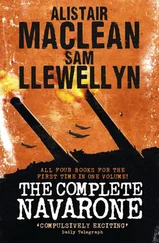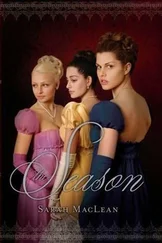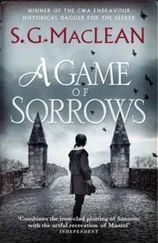‘The household knows not to disturb me at my work at night. Anyone going out would have gone by the outer stair, into the back yard.’
The session clerk’s voice was alive with anticipation. ‘And what night work have you on hand that must be carried out in such secrecy, apothecary?’
Arbuthnott did not disguise his disdain. ‘Calm yourself, Cardno. You know nothing of my trade. It is quiet I work in, not secrecy. You will have to look elsewhere for the black arts you crave.’
The session clerk’s breathing grew agitated, but he could not master his tongue to respond before the provost intervened once more. ‘What of your wife and daughter? What do they say of his movements?’
‘My wife and daughter?’ The apothecary’s voice dropped. ‘There is such a mourning in my house this day, sir, that I have had not a word that can be understood from either of them since my neighbour woke us with this terrible news.’
There was a moment of silence and then the session clerk spoke. ‘And where is Charles Thom?’ The suddenness of Cardno’s question struck me like a cold knife. All of last night’s conversation with Charles and the doctor came back to me. And through it all James Cardno had listened.
Arbuthnott was hesitant now, answering slowly. ‘I do not know.’
‘What do you mean, man?’
‘I mean what I say. I do not know where he is. I have not seen him since we sat at table last night. He was morose, as has been the case with him for some time now. I supposed he had taken early to his bed.’ At this the session clerk snorted, but Arbuthnott paid him no heed. ‘My neighbour arrived with this news at about our normal time of rising. Charles is often tardy in the mornings and I did not think it strange not to see him then.’ I smiled to myself as I thought of the regular sight of my friend flying past my window to the song school long after my own scholars were well settled. ‘I wonder that he has not joined us yet, though. Perhaps he is comforting the women …’ But his voice trailed off, and even I, who was probably Charles Thom’s greatest defender in that room, did not believe it.
Cardno murmured something in the baillie’s ear, and Buchan nodded. I had no doubt that the baillie had already been well apprised of Charles Thom’s conversation and demeanour in the inn the night before, and of the time at which he had left it. Buchan turned to the two town serjeants who had been waiting all this time at the doorway. ‘Find Charles Thom and bring him here. Look first at the apothecary’s, and if you do not find him go to the song school, though I doubt he will be there. There were urchins enough on the road as we came here.’ He turned accusing eyes on me. ‘There will be much wickedness in the streets of Banff this day with neither song nor grammar school at its work.’
I looked at the body of Patrick Davidson, still lying on the provost’s great hall table where it had been laid. ‘There has been much wickedness on the streets of Banff already,’ I said quietly. Even at a time such as this, when a young man of good family and great promise lay murdered by some unknown hand, the authorities of the burgh thought of nothing before they thought of public order.
When the serjeants had left, the provost sat down wearily on a settle near the fire. He called for a servant and asked for the fire to be lit and for refreshments to be brought. I noticed for the first time how tired he was. Dark circles beneath his eyes spoke of many a disturbed night, and the effort of standing up to the news of the last hour had taken the strength almost entirely from him. His usual demeanour was one of great strength and assured purpose. The son of a successful merchant burgess of Banff, he was not of humble origins, but it was clear, and no one doubted of it, that he intended to end life at a higher rank than he had begun. He was the first of his family to attain to the position of provost, the foremost citizen of the town. And indeed, he was the first provost in several generations not to have sprung from the Ogilvies, lairds of Banff and of many surrounding strongholds and estates besides. Walter Watt was the coming man, and those of sense could see it. Forthright, and with little warmth or humour, he was not a man to my own tastes, and I doubted whether, regardless of my own disgrace, we would ever have been friends.
Above the great stone hearth by which he sat was the portrait by George Jamesone which I had heard of before, but never seen. I knew little about painting, and suspected the provost knew scarcely more, but I understood the portrait of Walter Watt and his first wife, Helen, to be a signal of intent. It had been painted not long before Helen’s death, and well before her husband had attained to the heights of the provostship. Walter Watt would be somebody. No portrait of Walter Watt and his present wife, or their four children, the seedlings of his dynasty, adorned the walls. He loved Geleis Guild well enough, that was clear. Perhaps, though, no matter how many strong and healthy sons she bore him, she could never take the place of the pale young woman who stood silent by his side above us, in her hand a bunch of delicate flowers, of which several had already fallen to the floor.
The baillie took up his stance in front of the provost and with his back to me. The provost indicated a seat and, to my surprise, the baillie took it. It was his custom, when on public duties – and I had never seen him employed on any other – to stand towering over those with whom he had to deal. Spare of build – his very frame declaring the asceticism of his life – William Buchan was nonetheless a tall man, and he used his height to give force to his words. That he and the provost, constrained though they were to have daily dealings with one another on the business of the burgh, had little enough to say to one another at other times, was well known. It was not an antipathy such as existed between Buchan and Robert Guild, the minister, where one would gladly have seen the other ousted from his position; it was rather a discreet avoidance. Whatever he might think of the provost’s life, Baillie Buchan well knew he could never oust him – I doubted indeed whether he would even want to. For his part, the provost well knew he would never be usurped by William Buchan. Yet there existed between the two men a palpable and mutually understood dislike. It was as if the understanding of this was the very basis upon which they could continue to function together. Having made himself as comfortable as his principles would allow him to be, the baillie continued with his investigation.
‘When did you last see the boy?’
The provost considered a moment. ‘It was on Sunday night, after the evening service. He was here a little after six – he was to dine with myself and Jaffray. The doctor is ever anxious for news of the continent, and the war.’
At this Gilbert Grant nodded, having said little since our arrival at the provost’s house. ‘Aye, poor Jaffray. I sometimes think he only took part of his heart home with him when he returned to Banff. He is here with us, yet I believe in his mind, somewhere, he is still in Helmstedt, or Basel or Montpellier, with those dear friends of his youth, now so far dispersed.’ I knew what Gilbert Grant said to be true. Jaffray’s greatest recreation was to read and re-read the letters of those companions of his student days. Some of course had pre-deceased him, but only a few. Now, though, he hardly knew who lived still and who was dead. The ravages of this infernal war, tearing the Empire to shreds these last eight years, had distorted the old lines of communication to the extent that many no longer existed.
The baillie had no interest in this diversion. ‘You say “was to dine”. Did he not wait on his dinner?’
Читать дальше












